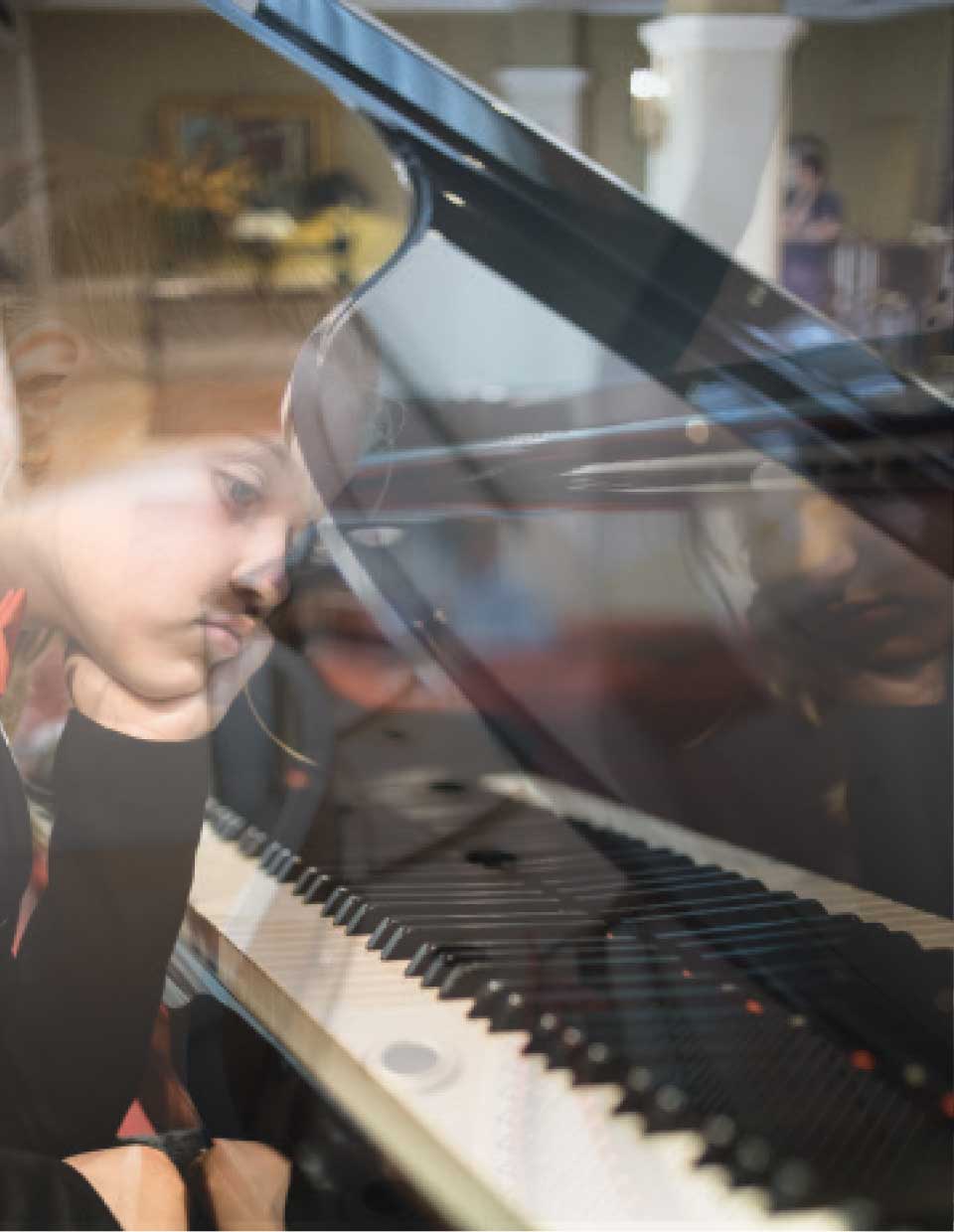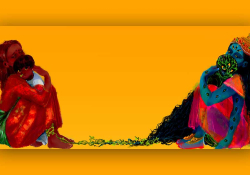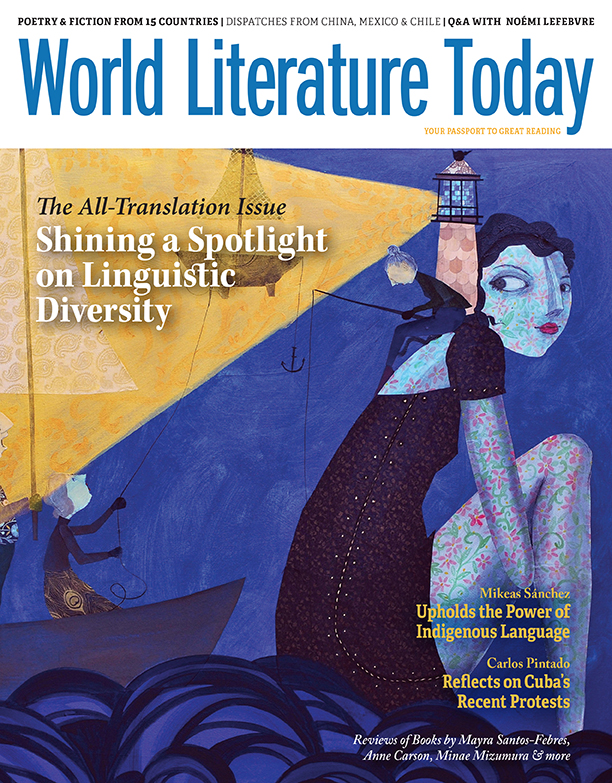Revolutionary Étude

Why would a girl of fourteen choose a minor key? Let Chopin carry you away, just as he does Nina, who brings the revolution to the keys of a prewar Steinway.
“Nina, you’re next,” they whisper to her backstage.
She takes a deep breath, but, halfway to the piano, doubts form. It’s stuffy. Dust particles circulate in a beam of sunlight, which has miraculously penetrated the dirty windows of the assembly hall. The hall is empty, except somewhere in the middle, about the tenth row up, the judging committee sits waiting. Two aunties and the director, a fuddy-duddy with a bald head, pale orange like a Turkmenian melon. All of them wear glasses and hold papers in their hands, although they need to listen, not read. It’s a music exam in Odessa, Ukraine, not an essay on a topic such as “How I Spent My Summer.”
Mama and Papa are in the hall, she thinks, both sitting there, I bet, with pale faces, holding their breath. Full of worry, chewing on their handkerchiefs. What’s wrong with them? Am I undergoing surgery? Do I have an infected appendix? So what if they don’t let me into the music college? What’s the big deal? Well, for them, it’s a big deal, maybe the biggest, but what do I care?
She goes up to the open piano with a quick, nervous step. It’s an antediluvian, prewar Steinway with a thin cobweb of cracks on the top and peeling black lacquer on the sides. The keys are touched by yellow. She has a sudden fear: so much emotion has built up, the old Steinway might not withstand her pounding. It might collapse under her assault like an elephant at a circus—crash, bang, splat!
She has a sudden fear: so much emotion has built up, the old Steinway might not withstand her pounding.
I will bang it out in such a way, she now decides, sitting down at the keyboard, not only will they not accept me to this school, but they also won’t even take me as a dishwasher. . . . The piece she chose is most suitable for the occasion—Chopin’s “Revolutionary Étude.” Just you wait, a revolution is coming!
She doesn’t know for sure who this “you” is. She assumes it’s the entire world. She stumbled onto this piece by accident, but the moment she saw the sheet music and looked at the opening chords—sharp and turbulent—she wanted to play it. After the first bounding over the waves, quickly, with fire—allegro con fuoco—she felt the music was prompting her to say, “To hell with it!”
To hell with it! And right after the pause, an even angrier “To hell with it!”
Well, how else could she express how her life turned out in its second half, after her seventh year? Not by accident, the étude she chose is in the key of C minor. It may surprise people: why would a girl of fourteen choose a minor key?
She raises her hands and attacks the yellowed keys. The left hand races to the left, filling the hall with a rumbling roar, while the right strikes the tragic chords of the heroic theme. From the first measure to the tenth. Ta-ta-ta-there! Ta-ta-ta-there! The piano holds up; it does not collapse.
And once again, da capo, my dear committee, . . . da capo al fine! Again, from beginning to the end, to the last chord!
So, how did this happen? How did I condemn myself to eternal torment? She wonders about this sometimes. She was growing up like any other child, but the moment she turned seven, her parents said, “You need to learn music.”
They took her on the trolley to a music school on the other side of Odessa and enrolled her in a piano course. The teacher started right away. To check Nina’s sense of rhythm, she tapped a pencil on the table and asked her to repeat it. To check her ear for music, she asked her to sing the New Year’s tune, “In the forest, a fir tree was born . . .” And so, the lessons began. The teacher told Nina where the notes were and what they were called, but they looked like crows sitting on the fence to her. So what?
It was boring. Every day, after school, Mama had to drag her to her lessons.
“I don’t want to play the piano,” she whined.
“It doesn’t matter what you want,” Mama insisted. “Don’t forget, you’re a Jew. That means they won’t let you study to be a doctor or a lawyer. But with music, you’ll be somebody. Look at Boris (Busya), Emil Gilels, David Oistrakh. . . . If you become a star, they’ll overlook the fact you belong to the wrong race. And if you don’t become a star, you’ll still finish the conservatory, or a music college at least, and you can teach music. You won’t go hungry.”
She turned her big brown eyes on them. Why in the world do you tell me such things? We covered all this at school, she told them, we live in the Soviet Union, you know, not in some horrible place like America where they hang Negroes from the limbs of trees. All our different nationalities and races have equal rights. It says so in our school reader.
A blurry white glare of hands appears in the raised lid of the grand piano; the hands come together, then move apart, like quarreling lovers, only to pause in the air and then fall on the keys with deafening chords.
To hell with it! To hell with it!
Papa is tall and handsome. In the corner of her parents’ bedroom, there is a piano. Papa used to sit at it every morning and clear his throat, accompanying himself as he sang mi-mi-mi, ma-ma-ma, and mo-mo-mo. As she grew up, she learned her father sang in a large, bluish-gray building with sculptures on the sides of the main entrance. It was the opera and ballet theater. All the girls at her school looked at her with envy. How lucky she was to have such a remarkable papa, one who sang not just anywhere, but at the opera!
They took her entire class to visit, but she didn’t like it. The plush seats, once a vibrant crimson, were threadbare and reeked of mothballs. . . . And the singing was mournful. Outside the theater was sunshine, blue sky, the sea not far away. Here it was a dark hall, with woeful faces on the stage. And the faces in the audience were hardly more cheerful. They were totally doloroso, nothing but despair . . .
And Papa’s face was also seldom happy. He was sad, always sad.
“Calm down,” her mama would say from time to time. “Calm down now.”
But he didn’t calm down. At dinnertime, when the roast was served and Nehama’s mouth was watering, he, instead of eating, would fold his napkin for a long time. First, he would double it. Then, thinking it over, he would fold it in four. Then—in octavo. And, after a pause, he would slowly, step by step, unfold it.
So now—appassionato con forza—passionately and with power. To hell with it! To hell with it!
The mystery of why her papa was always sad lasted a long time. But then one day it became clear: even though he sings in the opera, and his voice is lovely, warm and sad, he sings in the choir. He has no chance of becoming a soloist since his name is—sheer horror!—Isaac Rafailovich Meystel. It’s impossible to come up with a worse one, he shakes his head. You can’t hide behind any part. Not the first name, not the patronymic, not the surname.
Sometimes, he said at the table, if only he were a bass, not a tenor. And not any kind of bass, but one with a range from a high and melodious cantante, needed for the roles of Mephistopheles and Boris Godunov, to a low and earthshaking rumble, needed for the parts of Ivan Susanin and Khan Konchak. Then they would make him a soloist. They’d do it in his Odessa opera house, just as they’d done with Mark Reisen at the Bolshoi in Moscow, despite his surname . . .
To hell with it! To hell with it!
From time to time, Papa would look at her with his big beautiful and sad eyes, and one day she realized what he was thinking. May she at least, his daughter, his only child, achieve what he hadn’t achieved.
And the years of torture went on: studying at two schools—regular and musical, taking the trolley from one to the other, looking at her reflection in the window and thinking, “How unhappy I am! My girlfriends finish their homework and run around in the yard, skip rope or play hopscotch on the sidewalk. I drag myself from one school to the other. Every day is like hard labor. What key is it in? Play these scales twelve times . . . Name the chords . . . I will sing, and you write it down as a score . . . Now sing it . . .”
At home, her parents lock her in her room. Study solfeggio. Sing that exercise . . . Build chords . . . Learn the key . . . La-do-la . . . Re-mi-do . . . Once again! Again and again! They torture the child.
Without looking up, she watches her left hand, which is supposed to be indefatigable throughout the whole thing, making thunder . . .
Where on earth did they dig up such a tormentor? She’d seen a similar old hag in an ancient book of witchcraft.
When it was time to go to a music college, a private teacher prepared her. Where on earth did they dig up such a tormentor? She’d seen a similar old hag in an ancient book of witchcraft. With a pince-nez on a long cord, she sat up stiffly, and the only thing she knew how to do was to utter in her dull tone, “It’s not prestissimo here, little girl, not prestissimo. It’s allegro moderato. Slow down . . .”
Once, at the regular school, when she and her head teacher were alone in the classroom, Nadezhda Ivanovna sighed, shook her head, and said in a low voice, “Ah, Nina, Nina . . . In the class register, it turns out that, according to your birth certificate, you are actually Nehama. Poor girl! It will be tough for you in life. What lousy luck!”
Nehama shrugged. She already dragged herself to two schools every day—how could it get any worse?
But last spring she realized it could. There was a boy who lived nearby called Vitka. He was mop-headed, freckled, and broad-faced. His little gray eyes would give her the once-over every time she returned home, walking across the yard and swinging her music folder. He shifted from foot to foot but didn’t dare talk to her or even come close. But on International Women’s Day, March 8, he buzzed at the apartment door. She barely opened it when he thrust a little bouquet of violets almost under her nose and ran away.
Less than two hours later, the bell rang again.
“What do you want?”
But he looked down, frowning. He muttered, “Give the flowers back! I didn’t know you’re a Jew!”
He was lucky he’d brought them in his hand and not in a pot. She’d have smashed it over his stupid head! What a lout! Good heavens! Didn’t know she was Jewish? What an idiot!
To hell with ev-ry-thing! To hell with ev-ry-one!
Day after day, the music of the étude sank into Nehama. She read that Chopin wrote this piece when the news reached him that the uprising against the Russian tsar was suppressed in Warsaw. She recognized her own anger, her protest, her heartache in the sounds her fingers produced. The day before the exam, she played the étude with such ardor that, pulling the lace of her pince-nez and catching it midair with her wrinkled hand, the old hag rolled her myopic eyes at her, as if seeing her pupil for the first time.
“It looks as if your long sufferings, little girl, have made an artist out of you.”
The night before the exam, Nehama slept poorly. In snippets of her dream, Chopin appeared, exhausted by his trip to Stuttgart, where the tragic news from his homeland caught up with him. His deep-set eyes shone in the darkness.
Now she comes to the coda. Grief, lament for the perished heroes. A rush of rebellious feelings, a flurry of menacing swirling passages. They may face death—but they must never surrender! Never, never!
The last chord resounds. Nehama sighs deeply, without raising her head, and passes her tongue over her brackish, crusty lips. It seems the old man Steinway didn’t let her down; he sustained the onslaught and didn’t quack once.
A strange silence falls over the hall. It seems the committee has frozen in place; its members have stopped rustling papers and whispering to each other, as if they are frightened of something or fascinated by what is happening up there, onstage.
Everything brightens inside her, as if storm clouds, free from their heavy moisture and dispersed by a rising wind, are spreading across the sky. In the same way, the anger built up over the years at her parents, at her fate, is dissipating.
The genius of Chopin’s music, the genius of bright sadness, has taken hold of her, infected her blood.
By the way her heart has pounded, she knows from now on, starting from this moment, her life will move in another direction, one not known before. The genius of Chopin’s music, the genius of bright sadness, has taken hold of her, infected her blood. With a strange mixture of joy and anxiety, she feels that, besides these exciting sounds which arise from under her fingers and penetrate her heart, she doesn’t need a thing. That it’s impossible—and there is no point!—to live in any other way.
Translation from the Russian











